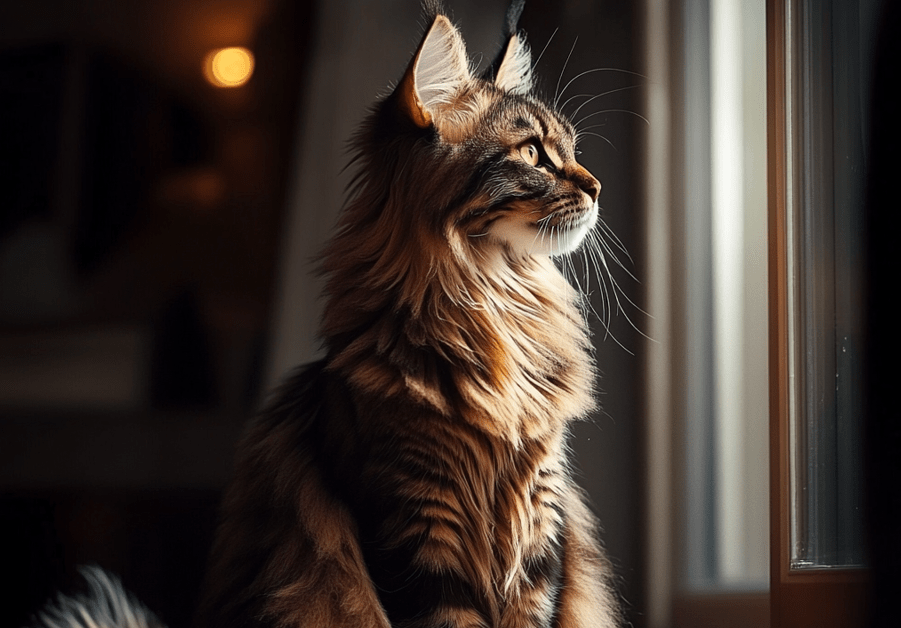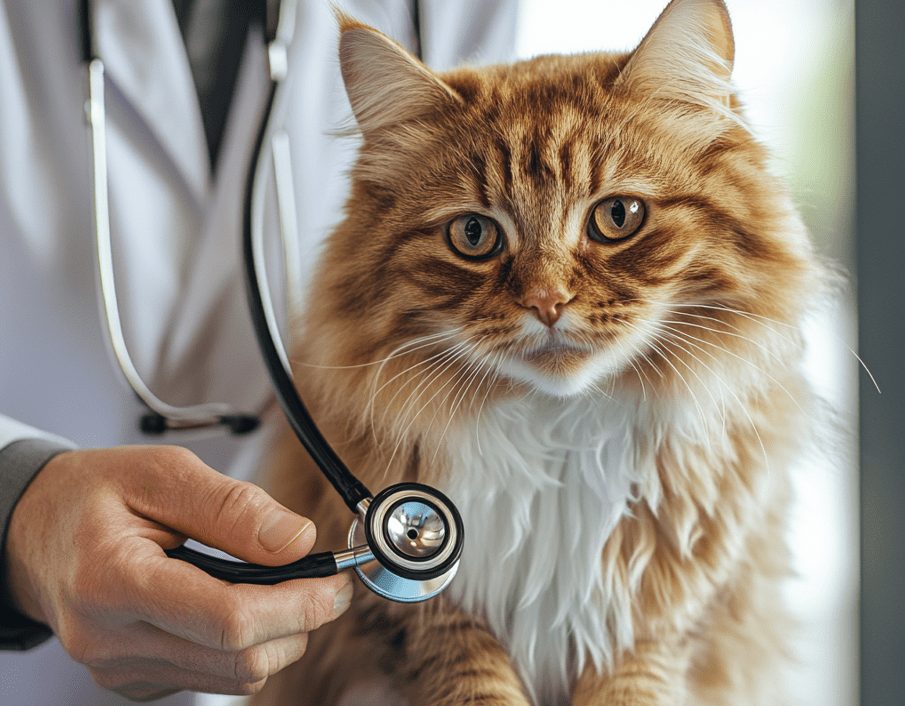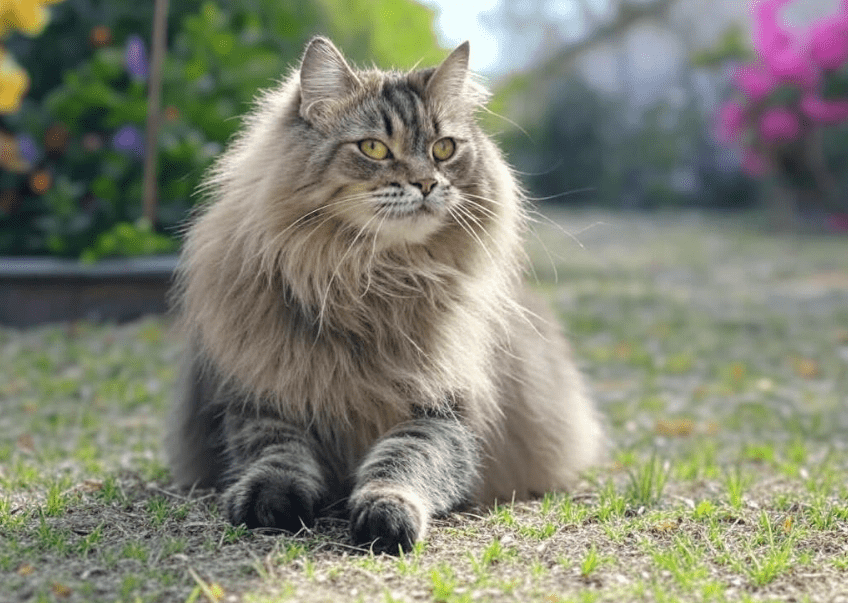
Maine Coons, with their majestic size and luxurious fur, are prone to pesky parasites like fleas, making it essential to know how to Spot and Treat Fleas on Maine Coon cats. These gentle giants require special attention due to their thick coats, which can hide fleas and complicate treatment. This comprehensive guide provides cat owners with actionable steps to identify flea infestations, treat them effectively, and prevent future issues. From recognizing early signs to choosing safe treatments, we’ll ensure your Maine Coon stays healthy, comfortable, and flea-free.
Understanding Fleas and Their Impact on Maine Coons
Fleas are tiny, wingless insects that feed on your cat’s blood, causing discomfort and potential health issues. For Maine Coons, whose dense, water-repellent fur provides an ideal hiding spot, fleas can be particularly problematic. Left untreated, fleas can lead to skin infections, allergies, or even transmit diseases like tapeworms. Maine Coons’ large size and active nature also mean they may encounter fleas in outdoor environments, making vigilance key.
Why Maine Coons Are Vulnerable
Thick Fur: Their long, double-layered coat conceals fleas, delaying detection.
Sociable Behavior: Maine Coons often interact with other pets or explore outdoors, increasing exposure.
Sensitive Skin: Their skin can develop allergic reactions (flea allergy dermatitis) to flea bites, causing intense itching.
By understanding these risks, you can take proactive steps to protect your Maine Coon from fleas and their complications.
How to Spot Fleas on Your Maine Coon
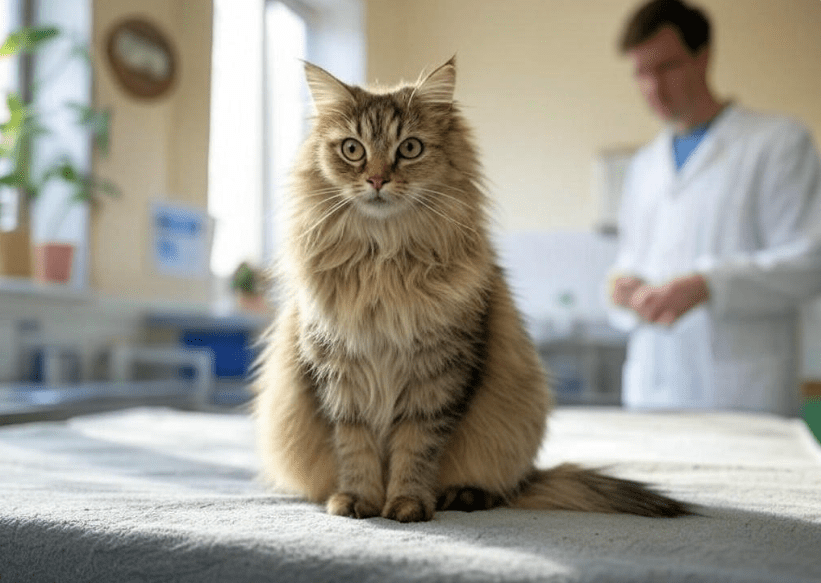
Early detection is critical to preventing a full-blown infestation. Here’s how to identify fleas on your Maine Coon:
1. Look for Behavioral Signs
Maine Coons are expressive, and changes in behavior often signal fleas. Watch for:
Excessive Scratching: Persistent itching, especially around the neck, back, or tail base.
Grooming Overdrive: Over-grooming or biting at specific areas, which may lead to hair loss.
Restlessness: Your normally calm Maine Coon may seem agitated or unable to settle.
Skin Sensitivity: Redness, scabs, or hot spots from scratching or allergic reactions.
If your cat is vocal, like many Maine Coons, they may also meow or trill more to express discomfort.
2. Inspect the Coat and Skin
Maine Coons’ thick fur requires thorough checks. Use these techniques:
Part the Fur: Use a fine-tooth flea comb to part the fur, focusing on the neck, back, and base of the tail. Look for tiny, fast-moving brown or black insects (fleas) or small black specks (flea dirt).
Check for Flea Dirt: Flea dirt looks like pepper but turns reddish-brown when wet, as it’s digested blood. Place specks on a damp paper towel to confirm.
Examine the Skin: Look for redness, bumps, or sores, especially in warm areas like the belly or armpits.
Use a Magnifying Glass: For subtle signs, a magnifying glass can help spot fleas or eggs in dense fur.
Comb your Maine Coon daily during flea season (spring and summer) to catch infestations early.
3. Monitor for Secondary Symptoms
Fleas can cause complications that manifest as:
Hair Loss: Patches of thinning fur from scratching or grooming.
Flea Allergy Dermatitis (FAD): Intense itching and inflamed skin from an allergic reaction to flea saliva.
Tapeworms: White, rice-like segments in your cat’s feces or around their anus, as fleas can carry tapeworm eggs.
Anemia: In severe cases, pale gums or lethargy, especially in kittens or senior Maine Coons.
If you notice these symptoms, consult a veterinarian immediately for diagnosis and treatment.
Tools for Detection
Invest in these tools to make flea checks easier:
Flea Comb: A fine-tooth comb designed to trap fleas and flea dirt.
White Towel: Comb your cat over a white surface to spot fleas or dirt more easily.
Flashlight: Helps illuminate hidden areas in their thick coat.
Regular grooming sessions not only help detect fleas but also strengthen your bond with your Maine Coon.
How to Treat Fleas on Your Maine Coon
Once you’ve confirmed fleas, act quickly to eliminate them from your cat and environment. Here’s a step-by-step treatment plan:
1. Consult Your Veterinarian
Before starting treatment, consult a vet to ensure products are safe for your Maine Coon, especially if they have health conditions or are pregnant. Your vet may recommend:
Prescription Treatments: Stronger, vet-approved options like selamectin (Revolution) or fluralaner (Bravecto).
Diagnostic Tests: To check for secondary issues like tapeworms or skin infections.
2. Choose Safe and Effective Flea Treatments
Maine Coons require treatments tailored to their size and coat. Popular options include:
Topical Treatments: Apply products like Frontline Plus or Advantage II to the back of the neck. These kill fleas and prevent reinfestation for 30 days. Ensure the dosage matches your Maine Coon’s weight (often 15-25 pounds).
Oral Medications: Fast-acting pills like Capstar kill adult fleas within hours but don’t prevent reinfestation. Combine with a topical for long-term control.
Flea Collars: Seresto collars offer up to 8 months of protection but may irritate sensitive Maine Coon skin. Monitor for reactions.
Shampoos and Sprays: Flea shampoos (e.g., Adams) provide immediate relief but aren’t long-lasting. Use sparingly, as Maine Coons dislike water.
1.Never use dog-specific flea products, as they may contain permethrin, which is toxic to cats.
2.Follow dosage instructions precisely to avoid overdosing your large Maine Coon.
3.Avoid over-the-counter products without vet approval, as they may be less effective or harmful.
3. Bathe and Groom Your Maine Coon
While Maine Coons aren’t fond of baths, a flea bath can reduce the flea population. Here’s how:
Use a Cat-Safe Flea Shampoo: Choose a gentle, vet-recommended product.
Lukewarm Water: Keep your cat calm with warm water and a non-slip mat.
Comb Post-Bath: Use a flea comb to remove remaining fleas or eggs.
Dry Thoroughly: Maine Coons’ thick fur takes time to dry, so use a low-heat pet dryer to prevent chills.
Regular brushing with a slicker brush also helps remove fleas and keeps their coat healthy.
4. Treat the Environment
Fleas lay eggs in your home, so environmental control is crucial:
Vacuum Daily: Focus on carpets, furniture, and your Maine Coon’s favorite spots. Dispose of vacuum bags to prevent reinfestation.
Wash Bedding: Launder your cat’s bedding, blankets, and your own linens in hot water weekly.
Use Flea Sprays or Foggers: Products like Vet’s Best or Siphotrol kill fleas in the home. Follow instructions and remove pets during application.
Treat Outdoor Areas: If your Maine Coon goes outside, apply pet-safe yard treatments to reduce fleas in grass or soil.
5. Address Secondary Health Issues
Fleas can cause complications that require additional care:
Flea Allergy Dermatitis: Your vet may prescribe antihistamines or steroids to reduce itching and inflammation.
Tapeworms: Deworming medications like praziquantel treat tapeworm infections.
Skin Infections: Antibiotics or medicated creams heal sores or hot spots.
Anemia: Severe cases may require blood tests and supportive care, like fluids or supplements.
Monitor your Maine Coon’s recovery and follow up with your vet if symptoms persist.
Preventing Fleas on Your Maine Coon
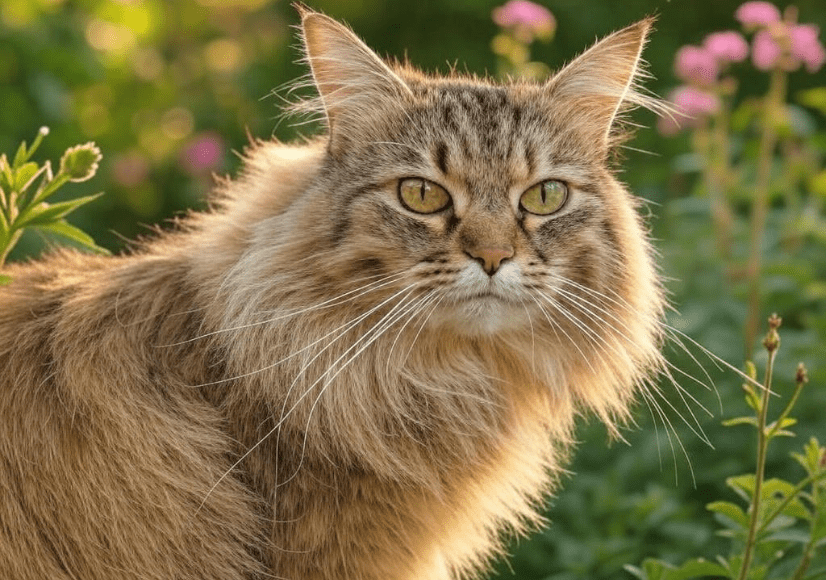
Prevention is easier than treatment. Keep your Maine Coon flea-free with these strategies:
1. Use Year-Round Flea Preventatives
Apply vet-recommended flea preventatives monthly, even in winter, as fleas can survive indoors. Products like Revolution or Bravecto offer broad-spectrum protection against fleas, ticks, and other parasites.
2. Maintain a Clean Environment
Regular Cleaning: Vacuum and wash bedding weekly to eliminate flea eggs.
Limit Exposure: Keep your Maine Coon away from stray animals or flea-prone areas like tall grass.
Pet-Safe Home: Use diatomaceous earth (food-grade) in carpets for natural flea control, but avoid overuse to prevent respiratory irritation.
3. Groom Consistently
Brush your Maine Coon 2-3 times a week to check for fleas and maintain coat health. Use a flea comb during high-risk seasons for extra vigilance.
4. Monitor Other Pets
If you have multiple pets, treat all of them simultaneously to prevent cross-infestation. Maine Coons often socialize with other animals, increasing their risk.
5. Regular Vet Checkups
Schedule annual or biannual vet visits to catch potential issues early. Your vet can recommend the best flea prevention plan for your Maine Coon’s lifestyle.
Special Considerations for Maine Coons
Maine Coons’ unique traits require tailored flea management:
Large Size: Always use weight-appropriate dosages for treatments.
Thick Fur: Spend extra time combing and inspecting hard-to-reach areas.
Water Aversion: Minimize baths and opt for dry grooming or topical treatments when possible.
Sociable Nature: Their friendliness may expose them to other animals, so check for fleas after playdates or outdoor adventures.
Common Mistakes to Avoid
Ignoring Early Signs: Don’t dismiss mild scratching as normal grooming.
Using Incorrect Products: Avoid dog flea treatments or unverified natural remedies like essential oils, which can be toxic to cats.
Neglecting the Environment: Treating only your Maine Coon leaves fleas in your home to reinfest.
Inconsistent Prevention: Skipping monthly preventatives increases risk, especially in warm climates.
Natural and Home Remedies: Proceed with Caution
Some owners prefer natural flea remedies, but they’re often less effective and riskier. For example:
Essential Oils: Oils like tea tree or lavender are toxic to cats and should be avoided.
Diatomaceous Earth: Safe in small amounts but can irritate lungs if overused.
Apple Cider Vinegar: May repel fleas when diluted and sprayed but doesn’t kill them.
Always consult your vet before trying home remedies, and prioritize vet-approved treatments for reliable results.
When to Seek Veterinary Help
Contact your vet if:
1.Your Maine Coon shows signs of severe itching, hair loss, or lethargy.
2.You suspect tapeworms, anemia, or skin infections.
3.Over-the-counter treatments don’t work within 48 hours.
4.Your cat has an adverse reaction to a flea product (e.g., drooling, tremors).
Prompt intervention prevents complications and ensures your Maine Coon’s comfort.
Final Thoughts on Flea Management for Maine Coons
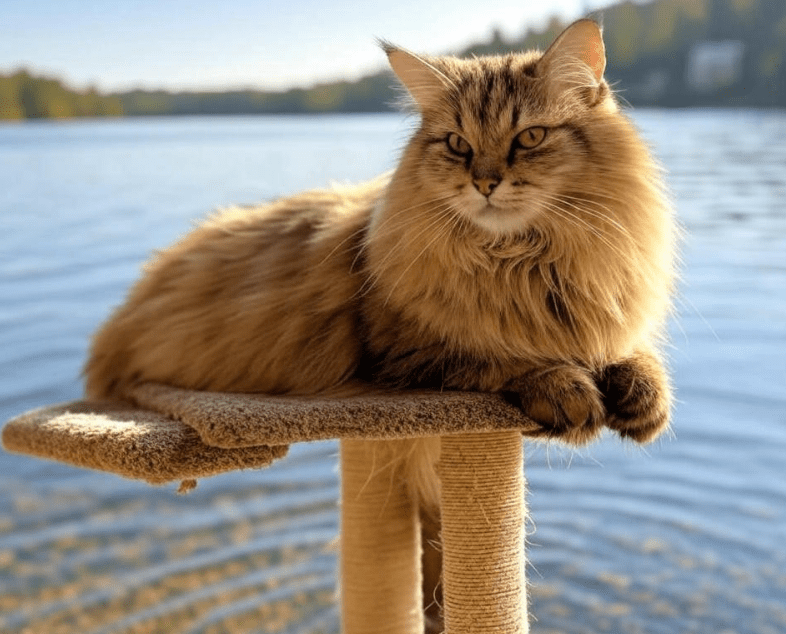
Fleas are a manageable challenge for Maine Coon owners with the right knowledge and tools. By learning to Spot and Treat Fleas on Maine Coon cats, you can protect your furry friend from discomfort and health risks. Regular grooming, vet-approved treatments, and a clean environment are your best defenses. Stay vigilant, act quickly, and keep prevention first to ensure your Maine Coon’s luxurious coat remains a source of pride, not pests. With these strategies, your gentle giant will thrive, flea-free, and ready to shower you with purrs and chirps.

